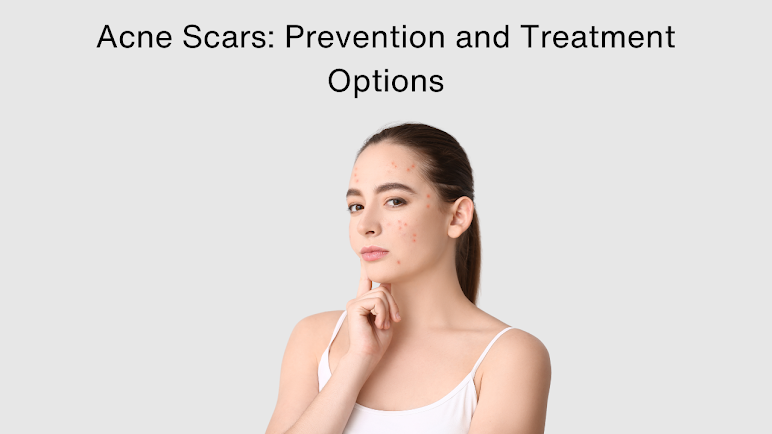Acne Scars: Prevention and Treatment Options
Acne scars can be a persistent reminder of past breakouts, affecting not just the skin's appearance but also an individual's self-esteem and confidence. While prevention is always preferable, sometimes acne scars are inevitable. However, understanding prevention strategies and treatment options can help manage and minimize their appearance, restoring a smoother and more even complexion.

Prevention Strategies:
Proper Skincare Routine: Maintaining a consistent skincare
routine is key to preventing acne scars. This includes gentle cleansing twice
daily with a mild cleanser suitable for your skin type.
Avoid Picking or Squeezing: It's
tempting to pick at acne, but this can worsen inflammation and increase the
risk of scarring. Hands can introduce bacteria to the affected area, leading to
infection and subsequent scarring.
Use Non-Comedogenic Products: Opt
for skincare and makeup products labeled as non-comedogenic, meaning they're
less likely to clog pores and cause acne.
Sun Protection: UV radiation can
darken acne scars, making them more noticeable. Regular use of sunscreen with
SPF 30 or higher can help prevent this.
Healthy Lifestyle: Eating a balanced
diet, staying hydrated, managing stress levels, and getting enough sleep can
contribute to overall skin health and reduce the likelihood of severe acne
outbreaks.
Treatment Options:
Topical Treatments: Over-the-counter
creams containing ingredients like retinoids, salicylic acid, or benzoyl
peroxide can help reduce acne and minimize the risk of scarring. Prescription-strength
versions may be recommended by dermatologists for more severe cases.
Chemical Peels: Chemical peels
involve the application of a chemical solution to the skin, which exfoliates
the top layer, promoting cell turnover and reducing the appearance of scars.
Different types of peels are available, ranging from superficial to deep,
depending on the severity of scarring.
Microdermabrasion: This non-invasive
procedure involves the use of a device to gently exfoliate the skin, removing
the outer layer and stimulating collagen production. It can improve the texture
and appearance of acne scars over multiple sessions.
Microneedling: Also known as
collagen induction therapy, microneedling involves the use of tiny needles to
create controlled micro-injuries in the skin, triggering the body's natural
healing process and stimulating collagen production. This can lead to smoother,
firmer skin and a reduction in acne scars.
Laser Therapy: Various laser
treatments, such as fractional laser resurfacing or intense pulsed light (IPL)
therapy, can target acne scars by stimulating collagen production, promoting skin
renewal, and reducing redness or pigmentation. Multiple sessions may be
required for optimal results.
Dermal Fillers: Injectable fillers
containing substances like hyaluronic acid or collagen can temporarily plump up
depressed acne scars, making them less noticeable. Results typically last
several months to a year, depending on the type of filler used.
Surgical Procedures: For deep or
stubborn scars, surgical techniques such as punch excision, subcision, or laser
surgery may be recommended to physically remove or break up scar tissue and
improve skin texture.
Platelet-Rich Plasma (PRP) Therapy:
PRP therapy involves extracting platelets from the patient's blood and
injecting them into the skin to promote healing and collagen production. It can
be used alone or in conjunction with other treatments to enhance results.
Conclusion:
While preventing acne scars is ideal, effective treatment
options are available for those already dealing with them. From topical
treatments to advanced procedures, there's a wide range of options to suit
different types of acne scars and skin types. Consulting with a dermatologist
can help determine the most suitable approach for each individual, leading to
smoother, clearer skin and a boost in confidence. Additionally, maintaining a
healthy skincare routine and lifestyle habits can help prevent future breakouts
and minimize the risk of new scars forming. With the right combination of
prevention strategies and treatment modalities, acne scars can be managed
effectively, allowing individuals to feel more comfortable and confident in
their own skin.


Comments
Post a Comment